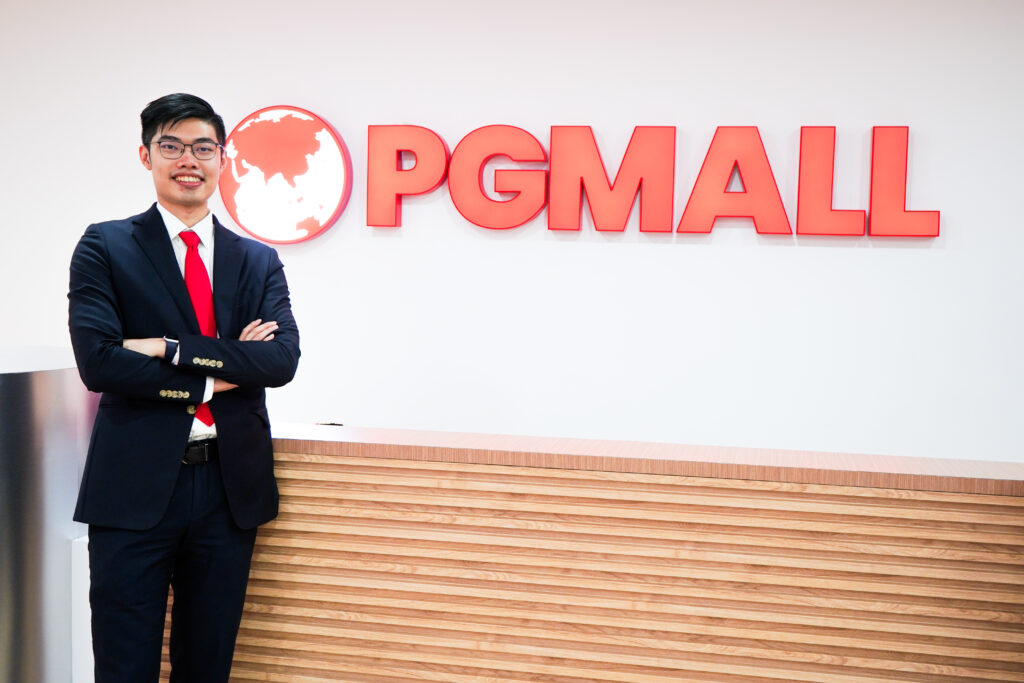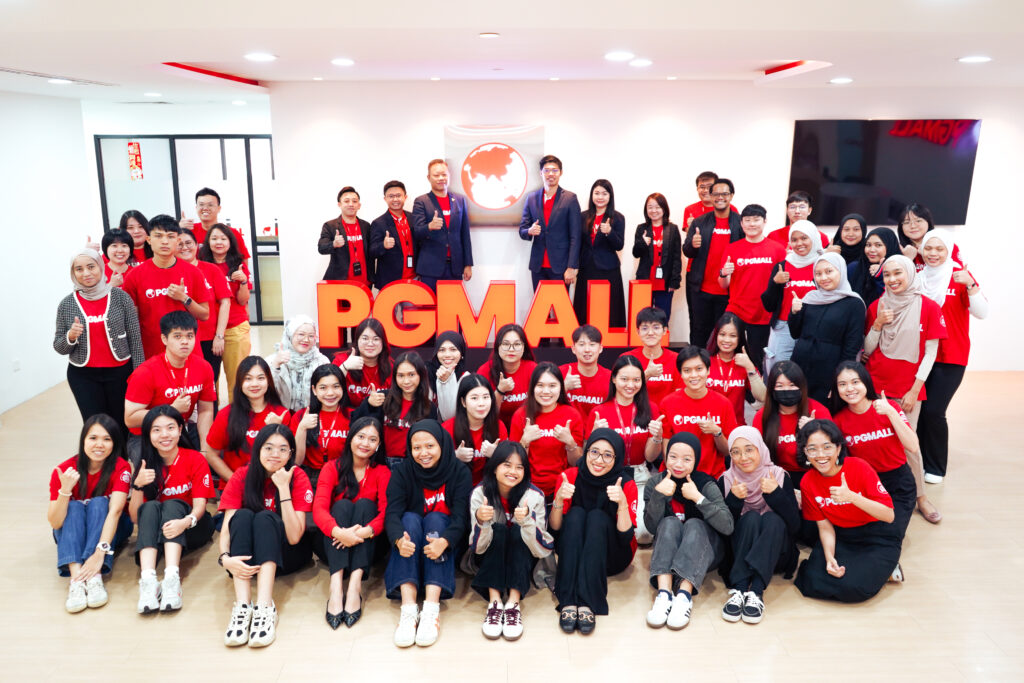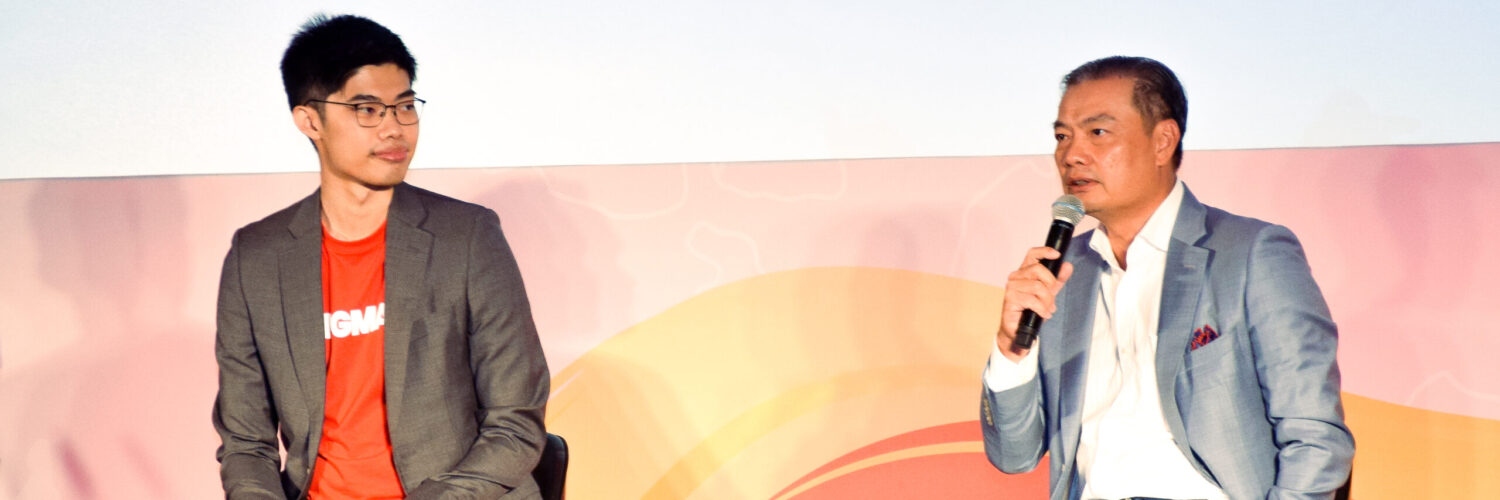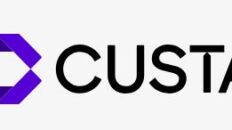Already Familiar
When Jerry Ng returned to Malaysia in 2020, the world was in lockdown — and the internet was booming. After three years in London working as a software developer, he’d built a solid career, armed with a physics degree from Imperial College and a master’s in computer science from UCL. But back home, the family business was expanding fast, and there was an opportunity that aligned perfectly with both his expertise and his upbringing.
“I was already familiar with the business. I helped out during school holidays,” Jerry said. “So when my father asked if I’d come back to lead PGMall, it just felt like the right time.”
Natural Extension

PGMall, the e-commerce arm of Public Gold Group, was launched in 2017 — before most Malaysians were shopping online. It started as a natural extension of Public Gold’s online gold sales, but quickly evolved into something bigger: a marketplace that now serves over 2 million users, featuring household goods to locally-made products, and yes, gold bars and jewellery.
“When we saw the success of selling gold online, we knew the infrastructure was there,” Jerry explained. “But the bigger idea was to give our customers more — to turn our ecosystem into something indispensable in everyday life.”
That infrastructure, as it turned out, was one of Jerry’s biggest advantages. Long before e-commerce became mainstream, his father, Dato’ Wira Louis Ng, was already experimenting with selling gold online as early as 2007. By the time PGMall was established, the company had already cultivated a loyal and digitally literate customer base — over a million strong — who trusted the brand and were comfortable transacting online.
“Having that customer base from day one allowed us to scale faster than most,” Jerry said. “These were people who already knew us, believed in us, and were ready to engage beyond gold.”
PGMall became the natural next step — enabling these same customers to not only continue purchasing everyday essentials on a trusted platform, but also to grow with it. Whether it was through buying household products, becoming sellers themselves, or helping bring other local Malaysian sellers onto the platform, the goal was always the same: to give back to the community that had built Public Gold from the ground up.
“It’s not just about growth for the company,” Jerry said. “It’s about creating an ecosystem where everyone — customers, small sellers, local brands — can profit and thrive.”
E-Commerce with a Local Soul
PGMall isn’t just another marketplace. Jerry’s approach is deeply local — from the sellers it onboards to the model it’s built on. “One thing that sets us apart is our ConsuMerchant model,” he said. “Our users don’t just buy — they sell, refer, and earn. It’s a very natural progression for someone who’s excited about a product and wants to share it.”
This idea — coined by Louis — became the cornerstone of PGMall’s growth strategy. But it was Jerry who translated that concept into a scalable tech product. The entire platform is built in-house, managed by their internal MIS and software development teams. “Because I have a tech background, I could take this vision and structure it properly. I knew we had to move fast, iterate often, and listen to the users — because the market changes so quickly.”

And PGMall has kept up. While other platforms encountered great challenges, PGMall maintained consistent traction, thanks in large part to its tight-knit user community. Public Gold Business Owners (PGBOs) and sellers aren’t faceless accounts — they’re part of an ecosystem that meets monthly, gives regular feedback, and helps steer the platform. “They’re our pulse,” Jerry said. “We host regular dinners and meetings with our top PGBOs. They tell us what’s working, what’s not, what customers are asking for. That relationship keeps us agile.”
Leading in His Own Way
Jerry is the kind of leader who balances inherited wisdom with his own brand of execution. While Louis is known for his strong intuition and decisiveness — Jerry describes his own approach as more measured, though equally responsive. “My father processes things fast. He has this ability to just get people and situations almost instinctively,” Jerry said. “I’m a bit more structured — I like to analyse and build systems. But I also know that in e-commerce, you need to move fast. So I’ve learned to balance speed with thoughtfulness.”
That agility, Jerry added, is not about reacting quickly for the sake of it, but making well-informed decisions with confidence and clarity. “The market changes constantly. You have to stay close to your users and be ready to pivot — but you also need to execute properly.”
Despite their different styles, Louis gave Jerry full ownership of PGMall early on. “My father trusted me to lead. He stays updated, but he rarely steps in. That freedom has been crucial in helping me build a team, make decisions, and move fast when needed.”
Lessons in Succession
For Jerry, stepping into a leadership role wasn’t just about proving himself. It was about creating continuity — and sustainability — for the entire ecosystem.
“Succession in business isn’t just about passing the baton,” he said. “It’s about evolving the business in a way that future-proofs it. That means bringing in tech, thinking like a startup, and always listening to your users.” One of the key lessons he’s learned is the importance of building his own team — not just inheriting one.
“You need people who believe in your vision. That doesn’t mean discarding what came before — a lot of our senior staff helped build the foundation of this company. But it does mean having a team that can execute the next phase.” And part of that next phase is making PGMall truly distinct — not just an extension of Public Gold, but a brand with its own value proposition. “Public Gold gave us the customer base, the trust, the credibility. PGMall is about broadening that — giving users more utility, and eventually making it a platform that stands on its own.”
Built-In Sustainability
What makes Jerry’s story compelling isn’t just that he returned home to take over a family business. It’s that he stepped into a business already designed to empower others — and chose to double down on that principle.
“Our business model is inherently sustainable,” he said. “When your customer becomes your partner, your growth is tied to their success. It’s not just transactions — it’s transformation.”
Today, many top PGBOs are full-time entrepreneurs who started with a referral link and a belief in the product. The platform has created new income pathways, especially for families and individuals looking for flexibility and ownership.
Jerry sees this as one of the company’s greatest accomplishments. “We’ve built a system where people can thrive — whether they’re selling gold, groceries, or gadgets.”
Thoughts to Second-Gen Leaders
Jerry is a second-generation entrepreneur who’s found his own leadership rhythm, carved out a space in the tech landscape, and built a thriving business that feels both grounded and forward-looking. When asked what advice he’d give to peers stepping into similar shoes, he paused thoughtfully.
“Listen. Learn. And be willing to earn your place. There are people in the company who’ve been there longer than you — they built the walls before you even stepped in. Respect that. But also don’t be afraid to innovate.”
And from the senior generation?
“Let your children build something of their own. Don’t micromanage. If they’re capable and they care, give them room to lead,” emphasised Louis.
Looking ahead, Jerry’s vision for PGMall remains ambitious but rooted in values: a tech-driven, community-led marketplace that continues to grow with its people. “Gold was the entry point. But we’re building something bigger — a platform for real, local economic empowerment,” he said. “That’s the legacy I want to shape.”









